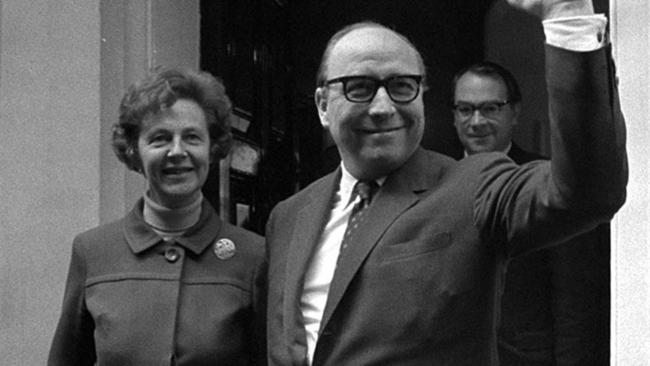‘Nearly Man’ Roy Jenkins embodied Asquith
THERE is a wealth of incidental political trivia in this fine book about former British chancellor Roy Jenkins.

WHAT a frontbench of Olympians they looked, Harold Wilson’s cabinet: James Callaghan, Denis Healey, Roy Jenkins, Anthony Crosland, Richard Crossman, Barbara Castle — all glossy with Balliol impress and published works, rapier judgments honed at Oxford Union debates and Fabian conferences and tested in the Tribune and New Statesman.
In 1974 I sat in Westminster and thought: Why can’t our Labor be more like theirs?
Except British socialism proved an illusion. The party membership settled on a morality tale of right-wing leaders betraying the cause; in the 70s they drifted to fantasies of mass nationalisation, a siege economy and unilateral disarmament. Britain continued to fall behind Europe, whether Wilson, Edward Heath or Callaghan occupied the little flat in No 10.
Roy Jenkins came close to entering as tenant the glazed black Regency door. For stints in 1968-69 and 1972-73 he was seen as Wilson’s successor. Then in 1981 for a flickering moment he was described as “prime minister-designate” of a new centrist coalition. This opening, too, slipped away. Failure is more interesting than success and the appeal of John Campbell’s enjoyable 700-page biography of Jenkins is that it explores the life of a “Nearly Man”.
As two-time home secretary he delivered reforms, civilising and overdue: end of theatre censorship, legalisation of homosexuality and abortion, anti-discrimination statutes, prison reform. To social conservatives he was author of the permissive society but Margaret Thatcher repealed none of it.
As chancellor he was author and salesman of tough budgets but Labour was defeated by Heath in 1970 and the party turned isolationist. Its clamorous Left began agitating for a policy U-turn to reverse entry to the European Economic Community. Heath and Jenkins — he, as an opposition frontbencher — led the case for Europe. He had to face not only the hatred of the Left but the distaste of Wilson moderates for caring too little for Labour unity. Chances of Labour leadership evaporated.
For once, the casual leftist calumny of a social democrat “not being a real Labour man” rang true. When one of his supporters canvassed a vote for Jenkins from MPs in mining constituencies, he was met with a kindly brush-off: “Nay, lad, we’re all Labour here.”
In fact, as far back as the 1950s Jenkins was sui generis: not just a social democrat but one with a pronounced sympathy for the old Liberal Party. This was the core of his radicalism. He sensed the Labourist narrative for Britain was not working, that around 1950 it had peaked. Better to work in a loose progressive coalition than languish in a cranky, class-specific party sitting in opposition.
Certainly by the mid-70s, Keynesianism had run its course. In 1976 Jenkins argued that since 1964 the proportion of gross national product taken up by government expenditure had risen from 44 per cent to 60 per cent while producing no commensurate improvement in public service or social welfare. Further taxation would have to bite deep into average and below-average incomes. “We are here close to one of the frontiers of social democracy,” he said. Flashes of insight like this present him at his finest.
In this context there was appeal in a revival of something resembling the old British Liberal Party of Herbert Henry Asquith, prime minister from 1908 to 1916, leader of a reformist — boldly reformist — government in which the labour element sat as one part of a broad “progressive” coalition. Jenkins in a telltale gesture had written a 1964 biography of Asquith rather than a Labour leader. He even lived like an Asquithian: country house weekends, aristocratic mistresses (named and profiled by this biographer) and a gluttonous commitment to fine wine, rich food, big cigars. As a minister a two-hour lunch at Brooks or the Caprice was inviolable.
He had never taken the trouble to build support among MPs. To some he appeared arrogant or indifferent. Someone said his voice made John Gielgud sound like rough trade (hardly), another that the only thing he’d fight for would be a table in a restaurant (not so — it would need to be up to the standard of Villa Lorraine or Comme Chez Soi, his favourite Brussels restaurants). Claret lists were his catechism. It was easy to portray him as sybaritic or lazy. Rather, he subscribed to a “calculus of hedonism” that put politics in perspective.
There is a wealth of incidental political trivia in this fine book, from the split between communists and democratic socialists in the Oxford Labour Club in 1939 right through to the Iraq war (which Jenkins opposed and thought Tony Blair too inclined to see in stark terms of black and white), and including (for us) Jenkins’s observation that Australia was “the toughest, roughest, most self-interested government with which I ever had to deal”, probably over UK market entry.
I couldn’t think of a better book for a federal frontbencher to read, more practical for those in a Westminster system than any biography of a US president.
By 1981, when Jenkins led the exit of some right-wingers from British Labour into the new Social Democratic Party, his eloquence had turned flabby and ponderous; he spoke with “unbearable gravitas”. Others stayed in the party and fought Tony Benn and the Marxists, ending union domination and dumping Left policies. Jenkins can be seen as the grandfather of this reformed party that Blair came to lead or as “Twaitowous Woy”, the claret-sipping defector who misjudged Labour’s capacity for renewal, and set back the Labour revival.
In retirement he produced biographies of Gladstone and Churchill, successful but unoriginal. He agreed that some “Nearly Men” had more influence than some prime ministers but also said it would have been good to “have sat in the apostolic succession of 49” men and one woman from Robert Walpole. And he quoted Lord Melbourne, who said it was “a damned fine thing” to have been prime minister if only for two months. John Campbell, this authoritative and graceful biographer, says he was not remotely bitter. Life offered too much pleasure, after all.
Bob Carr is a former Labor foreign minister and NSW premier.
Roy Jenkins: A Well-Rounded Life
By John Campbell
Jonathan Cape, 832pp, $80 (HB)


